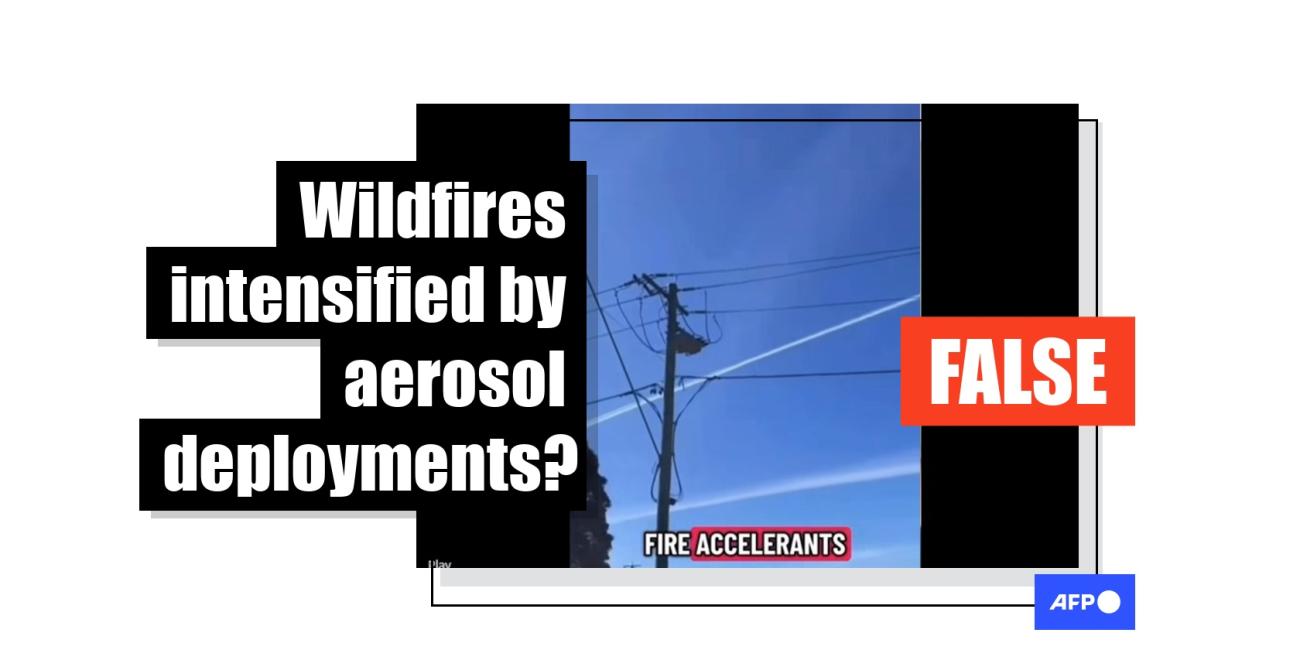
Gates-funded project will not 'chop down' millions of trees
- This article is more than two years old.
- Published on November 9, 2023 at 19:04
- 5 min read
- By Manon JACOB, AFP USA
Bill Gates has an array of investments in environmental projects, but an article claiming the billionaire philanthropist is financing the deforestation of 70 million acres in North America is false. The claim misrepresents a California-based venture that aims to reduce emissions by burying excess trees removed in controlled burnings, a project Gates is supporting through his investment fund.
"Hypocrite: Bill Gates is funding 70 million acres of Deforestation in North America," a November 3, 2023 post on X -- formerly Twitter -- claims, linking to an article by The Expose, a website that has repeatedly published misinformation on scientific issues.

Similar claims have been circulating across social media platforms in 2023 since California-based forestry tech company, Kodama Systems, announced in a December 2022 press release that it had raised $6.6 million in a funding round co-led by Gates's investment fund, Breakthrough Energy Ventures (archived here, here, and here.)
"Bill Gates is now funding a company that wants to CUT DOWN 70 million acres of trees and bury them underground. Why? To stop climate change of course," says another X post from October.

But the claims that say the start-up soutgh investment with the goal to cut down millions of acres of trees are false, Kodama Systems and Gates' private office both told AFP.
The US Department of Agriculture's (USDA) Forest Service -- partnering with Kodama in a pilot project -- said that its aim is to handle and bury the excess vegetation generated by forest thinning treatments -- a common technique in forest and land management -- in underground vaults (links archived here and here), in an attempt to dispose of the wood, and eliminate the carbon dioxide emitted by dead vegetation.
The number "70 million," referenced in the posts, started spreading after a July 28 article published by Forbes about the project, in which correspondent Christopher Helman wrote:
The article then goes on to describe how Kodama's project would offer a potential alternative to dispose of the excess wood that is not suitable for commercialization, and that is usually destroyed in controlled burnings. The "70 million acres" is not directly linked to Kodama's project or Gates' investments in Helman's article.
A representative for the private office of Bill Gates confirmed to AFP on November 7 that the claims about deforestation were false.
"Kodama has developed forest management systems designed to increase forest productivity, prevent catastrophic wildfires, and increase carbon capture by burying dead trees to permanently store the carbon they captured over their lifetimes," they wrote in an email.
Kodama spokesman, James Sedlak, also said: "Breakthrough Energy Ventures is one of our investors, not Bill Gates directly."
In a September 26 email Sedlak said: "We're not cutting down trees for the sake of burying them to reduce CO2 emissions."
Instead, the start-up focuses on dead vegetation removed as part of the USDA's Forest Service "Wildfire Crisis Strategy." The agency said in a January 2022 report that it would treat up to 20 million acres on National Forest System lands and an additional 30 million acres on other federal, state, tribal and private lands over 10 years -- to reduce the risk of high-intensity wildfires.
Scott Owen, national press officer at the USDA's Forest Service, said in an email on October 5 that these techniques can limit wildfire risks by removing "hazardous" materials (archived here and here).
"These treatments reduce overstocked forests to lower the threat of wildfire to communities," he said. This results in the removal of "woody biomass from forests that cannot be sold or safely removed via prescribed fire," he told AFP.
"Instead of traditionally burning the woody biomass, this pilot project stores it in underground wood vaults – avoiding pile burning costs, labor and carbon emissions," he added.
The Forest Service is supporting legal and financial research associated with this project "to determine if this limited pilot project can be replicated in other geographic areas," according to Owen.
But "the pilot project is from a total of 538 acres of the Inyo National Forest, so very small," he said.
Wood vaults
Plants play an important role in the carbon cycle (archived here).
When a tree grows, it removes and stores vast amounts of carbon dioxide from the atmosphere through photosynthesis (archived here). Photosynthesis outweighs the plant's respiration process, which -- as for any other living organism -- releases CO2 into the atmosphere. When the tree dies, however, carbon continues to be released through the tree's decomposition, while photosynthesis has stopped.
Underground wood vaults -- which would provide sealed, oxygen-deprived environments -- could offer a promising alternative to get rid of the excess dead wood from forest-thinning North American forests, according to Ning Zeng, professor at the Department of Atmospheric and Oceanic Science and the Earth System Science Interdisciplinary Center at the University of Maryland.
He told AFP by email on September 23 that biomass burial via wood vault could be summarized as a "remaking coal" -- in which carbon in the form of "woody biomass" is taken out of the "fast" photosynthesis-decomposition process and transferred to a "slow geological carbon cycle" via human engineering.
"The wood residuals from thinning can be buried to prevent decomposition. Thus burial of fire thinning has the dual benefits of reducing direct fire risk -- damage to property, etc -- and reducing CO2 emissions," the professor said.
The method, according to Zeng, "has large potential in creating a net carbon sink, as long as the forests are sustainably managed and residual woody biomass is used."

Bill Gates and 'planting trees'
Gates sparked fresh controversy earlier this year when he told a climate conference organized by The New York Times he did not see large-scale tree planting as a solution to climate change (archived here and here).
"I don't use some of the less proven approaches," he said "I don't plant trees."
As of November 2023, Gates's Breakthrough Energy Ventures has taken stakes in 100 clean tech start-ups across climate sectors, including a Chicago-based company commercializing ethanol-fueled trucks and an Australian company producing feed supplements to reduce methane emissions in livestock (archived here, here and here).
AFP has previously fact-checked numerous false claims about Gates, often the subject of health-related conspiracy theories.
Copyright © AFP 2017-2026. Any commercial use of this content requires a subscription. Click here to find out more.
Is there content that you would like AFP to fact-check? Get in touch.
Contact us




